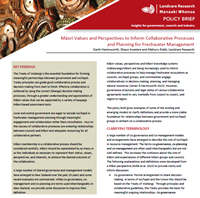VMO Update Issue 2

Welcome to 2016. We trust the Christmas and New Year period bought some welcome rest and relaxation. For the New Year we are excited to share with you some of our more recent research findings. These publications can also be found on the VMO webpage.
New Policy Brief
 Co-governance, co-planning and co-management: These terms are often used interchangeably and our new policy brief, Policy Brief 14, provides some useful definitions of these commonly used terms to clarify their meaning from a Māori perspective. In the context of collaborative processes, the brief outlines a number of kaupapa Māori-based guidance frameworks and tools used to support iwi and hapū. Last, it provides some existing and emerging models of co-governance, co-planning, and co-management in practice.
Co-governance, co-planning and co-management: These terms are often used interchangeably and our new policy brief, Policy Brief 14, provides some useful definitions of these commonly used terms to clarify their meaning from a Māori perspective. In the context of collaborative processes, the brief outlines a number of kaupapa Māori-based guidance frameworks and tools used to support iwi and hapū. Last, it provides some existing and emerging models of co-governance, co-planning, and co-management in practice.
Updates to the Policy Choice Framework
The Policy Choice Framework helps decision-makers choose policy instruments or interventions that are most likely to influence the behaviour of water users (broadly defined) and thereby improve freshwater outcomes. This framework is generally applicable to all resource management decisions. This updated version includes guidance on identifying types of trust between organisations and how this may affect cooperation.
New Reports
Representation and legitimacy in collaborative freshwater planning: This report focuses on the issue of representation – how affected interests are involved in collaborative deliberations– and specifically the perceptions of the legitimacy of this approach by those not directly involved in the deliberations themselves. It is based on focus groups conducted with community members in the Selwyn District of Canterbury.
Predicting the effects of water abstraction and land use intensification on gravel bed rivers: This report describes a Bayesian network that has been developed to support decision-making for large New Zealand gravel bed rivers where freshwater planning needs to balance increasing demands for irrigation water to support economic growth with in-stream ecological, social, and cultural values.
From our networks
RMA reforms: The RMA reforms outline two new plan-making options – streamlined planning processes and collaborative planning processes. The reforms are expected to encourage greater use of these approaches and also strengthen and provide greater consistency in iwi engagement in planning processes. More information on the proposed amendments and how to make a submission on the amendments can be found on the MfE website.
Land and Water Forum: The Fourth Report of the Land and Water Forum was released late last year. This report covers how to maximise the economic benefits of freshwater while managing within water quality and quantity limits that are set consistent with the National Policy Statement on Freshwater Management 2014.
